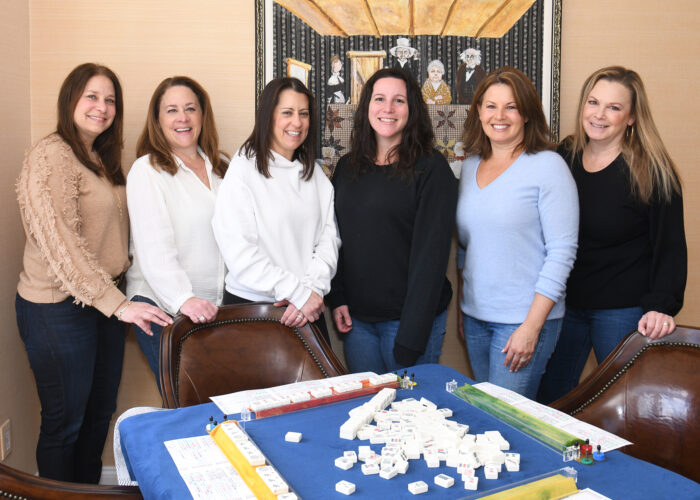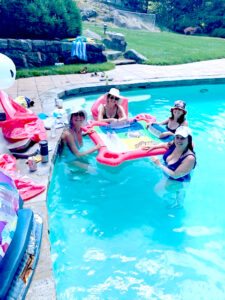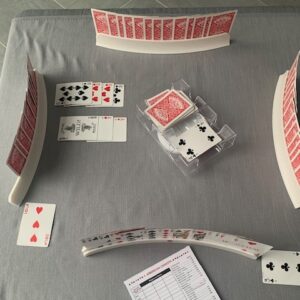
Chances are that if you live in the suburbs, you play or know someone who plays either mah-jongg or canasta. Though vastly different, the games are similar in the most important of ways; they are sources of socialization, entertainment, and cognitive stimulation. For many women who left the workforce to care for their children, these games are a lifeline where they can participate in adult conversation and share the experience of motherhood with other women in the suburbs. For some, these games are a passed down ritual from their mothers and grandmothers. For the elderly, it can ease loneliness and isolation.

What is Mah-jongg?
Mah-jongg is played by four people using domino-like tiles engraved with Chinese symbols and characters. The players draw and discard tiles to assemble a winning hand. Joan Rosenbaum, who teaches mah-jongg classes at North Castle Recreation Center, says “mah-jongg is a game of skill, strategy, socialization, and luck.”
Mah-jongg originated in China in the mid-1800’s primarily as a male gambling game. It began spreading throughout the world as a result of increased trade along ports of travel. In the 1920s it gained popularity in America. Naturally, with such widespread play across continents and cultures, various adaptations of the game developed and groups each had their own table rules. Many Chinese Americans played as a way of connecting to their heritage, but the game also became a popular pastime amongst Jewish women in the suburbs and in bungalow colonies in the Catskills. In 1937, a group of Jewish American women in New York City decided to standardize the rules of the game and formed the National Mah-jongg League. The league issues a card every year listing winning combinations of tile which change every year.
Rosenbaum eagerly awaits the new card’s release every Spring. After its release, her telephone always begins to ring with her friends calling to discuss the new hands. Rosenbaum remembers sitting by her mother and watching her play and wanting to be “just like her.”
“On game day in my house, I would put on a new tablecloth, put the racks out, mix the tiles, and sit down,” recalls Rosenbaum fondly. “The chattering would begin – what the women ate for dinner the night before, what they bought in the store, etc. Then the music of the clicking of the tiles began, a sound only a mah-jongg set can make. You cannot duplicate that wonderful sound.”
Armonk and Bedford residents Lisa Deitelzweig, Courtney Gordon, Aimee Marcus, Cindy Rosenblatt, Debra Tillinger, and Elizabeth Zimmerman have been playing together every Thursday for over 14 years. Both Tillinger and Zimmerman play with sets passed down from their grandmothers. They started playing when their children were in preschool and have kept Thursdays as their sacred mah-jongg day ever since. The women rotate houses weekly, serve lunch, and share lots of laughs.
“We went through the trenches together raising our children,” says Deitelzweig. “We support each other, and we have fun together. Our cardinal rule is ‘what is said at mah-jongg stays at mah-jongg.”
Besides playing and discussing everything ranging from politics, family, books, recipes, and tv shows, this group celebrates birthdays together and plans theatre and movie outings. Mah-jongg has been a jumping off point for many enriching activities in their lives.

What is Canasta?
Canasta, which means “basket” in Spanish, is a rummy-type game generally played by four players in two partnerships using two decks of cards. Players attempt to make melds of seven cards of the same rank and accrue as many points as possible. Canasta was invented in Uruguay in 1939 by two bridge players who wanted to create a quicker game than bridge but one with less of a luck factor than rummy. It spread throughout South America in the 1940’s, was introduced in America in 1949 and surged in popularity in the 1950’s. The Canasta League of America was founded to standardize the rules of the game.
Armonk resident Susan Cott, a private canasta instructor, says her whole life changed when she learned to play canasta.
“As a stay-at-home mom, I was always running errands and never made time for myself,” says Cott. “When I finally learned to play, it forced me to have at least one get-together a week with some friends. Additionally, I made so many new friends when my game would need a substitute player or when I would sub in someone else’s game.”
“Teaching canasta is such a joy for me,” she says. “There are two aspects that I love. Everyone is so confused at the first lesson, but then I start seeing the lightbulbs go off and that’s the best feeling for me. Secondly, I feel like I’m a matchmaker. When people walk away from my lessons having formed canasta groups and new friendships, that’s an amazing feeling. It’s very rewarding.”
Armonk resident Lori Cohen appreciates the game for its welcome diversion to her everyday life. “It’s my time to shut everything else out,” she says. “We’re often having so much fun chatting that we forget where we were in the game.”
During the pandemic, canasta and mah-jongg groups alike desperately missed their games. Determined to play, Rosenbaum and her friends took turns playing in each other’s garages dressed in coats and hats. One of her friend’s coats almost caught fire one day from one of the heaters. Zimmerman and her group played outside or on Facetime with iPad. To really spice things up, Bedford resident Darielle Cohen even invited her group over for “pool canasta” with an inflatable floating card table in her swimming pool. Clearly, no one was willing to relinquish these meaningful moments of fun and camaraderie.
Besides all the fun, both games demand some serious mental gymnastics to stay engaged in conversation while simultaneously paying attention to the game and formulating a strategy. One thing is undeniable; bits of conversation between hands, while shuffling tiles or cards over the years has led to beautiful friendships.
For more information on mah-jongg lessons through the Town of North Castle recreation department, go to northcastleny.com.
To reach Susan Cott for your own canasta lessons, you can email her at canastamastasusan@gmail.com.
Lessons are available by private instruction or via the Town of North Castle Recreation Department.
